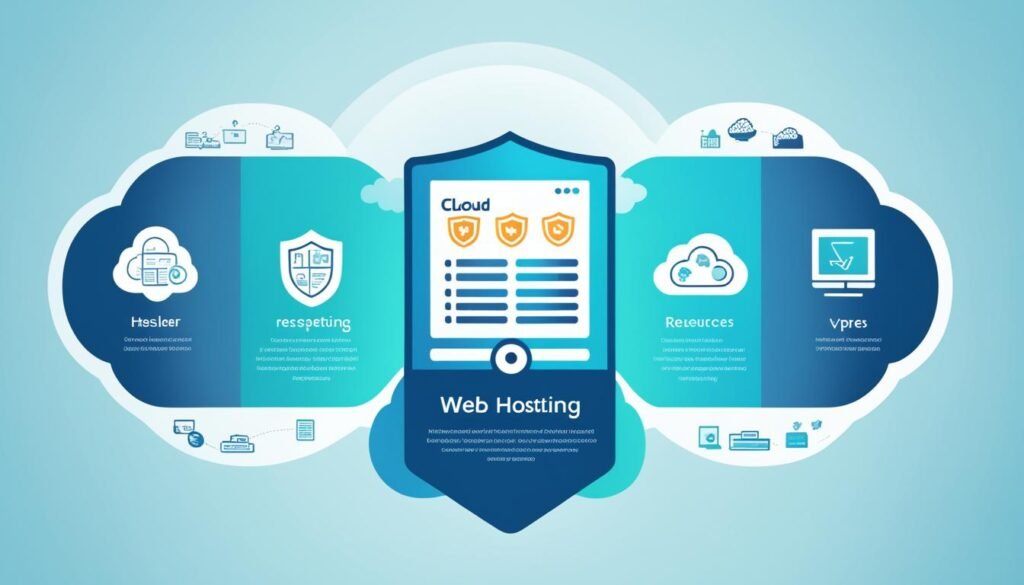If you’re looking for a reliable and trusted web hosting provider, look no further than Hostwinds. With a wide range of hosting services and a strong focus on reliability, security, and performance, Hostwinds is the ideal choice for individuals, small businesses, and enterprises alike.
Hostwinds offers a variety of hosting plans and options to cater to different website needs. Whether you’re a beginner starting with a shared hosting plan or a high-traffic website in need of a dedicated server, Hostwinds has you covered. Their services include shared hosting, VPS hosting, dedicated hosting, cloud hosting, and more.
In addition to their hosting services, Hostwinds also offers a range of additional features and services to enhance your web hosting experience. These include domain registration, managed hosting, SSL certificates, and email hosting. With Hostwinds, you can find everything you need in one place, making it a comprehensive solution for all your web hosting needs.
Hostwinds is known for its excellent customer support, ensuring that you have assistance whenever you need it. Their team of experts is available 24/7 to help you with any technical issues or questions you may have.
Whether you’re a blogger, an e-commerce business, or a large enterprise, Hostwinds provides the hosting solutions you need to succeed online. With their reliable server infrastructure, advanced security measures, and commitment to customer satisfaction, Hostwinds is the right choice for your web hosting needs.
Key Takeaways:
- Hostwinds offers a wide range of web hosting services, including shared hosting, VPS hosting, and dedicated hosting.
- They provide a variety of hosting plans and options to suit different website needs.
- Hostwinds offers additional features such as domain registration, managed hosting, SSL certificates, and email hosting.
- Their customer support team is available 24/7 to assist you with any technical issues or questions you may have.
- With Hostwinds, you can find everything you need in one place for a comprehensive web hosting solution.
Managed Hosting: The Solution for Easy and Optimal Web Hosting
Managed hosting is a comprehensive web hosting service that goes beyond basic server provision. With managed hosting, website owners can focus on their core business and leave the technical aspects of server management, security, updates, and maintenance to experts.
“Managed hosting is a game-changer for website owners who want to maximize their online presence without the hassle of server management.”
Managed hosting providers take care of all the behind-the-scenes work necessary to ensure optimal website performance, including resource allocation, security, and server updates. They continuously monitor and optimize server performance to guarantee fast website loading times and enhanced website security.
In the fast-paced digital landscape, every second counts. Slow-loading websites not only frustrate users but also lead to loss of potential customers. With managed hosting, website owners can rest assured that their sites will deliver a seamless user experience, improving customer satisfaction and conversion rates.
Technical issues can strike at any time, affecting website uptime and user experience. Managed hosting providers offer round-the-clock technical support to quickly address any issues that may arise. Their expertise, coupled with prompt response times, ensures minimal disruption and maximum peace of mind for website owners.
Automated backups and disaster recovery are critical aspects of managed hosting. Providers implement robust backup systems to protect website data and ensure quick restoration in the event of a server failure or other unforeseen circumstances. This safeguard is essential for businesses that rely on their websites to generate revenue and maintain customer trust.
In addition to being a reliable and secure hosting solution, managed hosting is also cost-effective. Website owners don’t need to invest in server hardware and software, reducing the total cost of ownership. Instead, they can leverage the resources and expertise of managed hosting providers at a fraction of the cost.
Benefits of Managed Hosting:
- Optimized website performance: Managed hosting ensures optimized server performance, resulting in fast website loading times and improved user experience.
- Enhanced website security: Managed hosting providers implement robust security measures and continuous monitoring to protect websites from security threats.
- Expert technical support: Round-the-clock technical support from managed hosting providers ensures quick issue resolution and minimal downtime.
- Automated backups and disaster recovery: Website data is regularly backed up and can be quickly restored in the event of a server failure or data loss.
- Cost-effective hosting: By eliminating the need for server maintenance and hardware investment, managed hosting offers a cost-effective solution for website owners.
Managed hosting is a scalable solution that can accommodate the growth of a website without compromising performance or security. As website needs evolve, managed hosting providers can seamlessly allocate additional resources, ensuring uninterrupted operation and a seamless user experience.
With managed hosting, website owners can focus on their core business while leaving the technical aspects of hosting to the experts. It’s a hassle-free and reliable hosting solution that ensures optimal website performance, enhanced security, and peace of mind for website owners.
Next, we’ll delve into the differences between managed and unmanaged hosting to help you make an informed hosting choice.
Understanding Managed vs. Unmanaged Web Hosting

In the world of web hosting, there are two main options to choose from: managed hosting and unmanaged hosting. Each option has its own set of benefits and drawbacks, and understanding the difference between the two is essential for making an informed decision that meets your specific needs.
Managed hosting is a service where the web hosting provider takes care of all technical aspects of hosting, including server management and support. This means that the hosting provider handles tasks such as server setup, maintenance, security, and backups, allowing you to focus on your website’s content and functionality. With managed hosting, you can rely on the expertise of the hosting provider’s technical team to ensure that your website runs smoothly and securely.
Some key benefits of managed hosting include:
- Technical support: With managed hosting, you have access to a dedicated team of technical experts who can assist you with any issues or concerns you may have.
- Server management: The hosting provider takes care of all server-related tasks, ensuring that your website performs optimally.
- Security and backups: Managed hosting includes built-in security measures and regular backups to protect your website and data.
However, it’s important to note that managed hosting can come with some drawbacks, including:
- Higher cost: Managed hosting typically comes at a higher price compared to unmanaged hosting due to the added technical expertise and support provided by the hosting provider.
- Restricted customization: With managed hosting, there may be limitations on the level of control and customization you have over your server environment.
On the other hand, unmanaged hosting requires website owners to manage the server themselves. This option is suitable for those with technical expertise and the desire for complete control and customization over their server environment. With unmanaged hosting, you have the freedom to install and configure software, choose your own security measures, and handle backups on your own.
However, unmanaged hosting comes with its own challenges and responsibilities. Some key considerations for unmanaged hosting include:
- Technical expertise: You need to have the necessary technical know-how to manage and maintain the server effectively.
- Budget: Unmanaged hosting can be more cost-effective as you are not paying for managed services, but you need to factor in the cost of your own technical support and server management.
- Control and customization: Unmanaged hosting gives you complete control and customization options, allowing you to tailor your server environment to your specific requirements.
- Security and backups: With unmanaged hosting, you are responsible for implementing and maintaining your own security measures and backups.
In summary, managed hosting provides a convenient and hassle-free solution for those who prefer to rely on the expertise of their hosting provider and focus on their website’s content and functionality. Unmanaged hosting, on the other hand, is better suited for individuals or businesses with technical expertise and the desire for full control and customization over their server environment.
When choosing between managed and unmanaged hosting, it’s crucial to consider your technical expertise, budget, level of control and customization required, and the importance of security and backups. Make sure to weigh the benefits and drawbacks carefully to find the hosting option that best aligns with your specific needs and goals.
The Advantages and Disadvantages of Shared Hosting
Shared hosting is a popular choice among website owners due to its cost-effectiveness and user-friendliness. It offers a budget-friendly hosting option that is suitable for individuals and small businesses starting their online presence.
One of the primary advantages of shared hosting is its affordability. By sharing server resources with other websites, the cost of hosting is significantly reduced, making it an ideal choice for those with limited budgets.
Shared hosting also provides a user-friendly interface and management system, making it accessible to beginners who may not have technical expertise. Website owners can easily set up and manage their websites with the help of intuitive control panels offered by hosting providers.
Maintenance and support are additional benefits of shared hosting. Hosting providers take care of server maintenance and provide technical support, ensuring that website owners can focus on their content and business goals rather than managing server issues.
However, shared hosting does have its drawbacks. One limitation is performance limitations due to resource sharing. When multiple websites are hosted on the same server, the resources are distributed among them, which can impact website loading times and overall performance.
“Shared hosting allows you to save costs, but it also means that you have to share server resources with other websites. This can result in slower loading times for your website, especially during peak traffic periods.” – John Smith, Web Developer
Furthermore, shared hosting often comes with limited customization options. Since multiple websites share the same server, customization choices may be restricted to maintain stability and security for all users.
Security concerns are also a consideration for shared hosting. While hosting providers implement security measures to mitigate risks, the shared nature of the server means that vulnerabilities of other websites can potentially affect yours. It’s crucial to choose a reputable hosting provider and regularly update and secure your website to minimize security risks.
Overall, shared hosting is a cost-effective and user-friendly option for website owners, particularly those starting their online journey. However, it’s essential to consider its performance limitations, limited customization options, and security concerns when making a hosting decision.
| Advantages of Shared Hosting | Disadvantages of Shared Hosting |
|---|---|
| Cost-effective hosting option | Performance limitations due to resource sharing |
| User-friendly interface and management | Limited customization options |
| Maintenance and support provided by hosting provider | Security concerns in a shared hosting environment |
Key Features to Consider in a Shared Hosting Solution
When choosing a shared hosting solution, it’s important to consider several key features that can enhance your hosting experience and meet your website’s needs:
Resource Allocation
Ensure that the shared hosting solution provides sufficient resource allocation to support your website’s requirements. This includes disk space, bandwidth, and processing power, ensuring that your website operates smoothly and efficiently.
Control Panel
A user-friendly control panel is crucial for managing your website and hosting account. Look for a shared hosting solution that offers an intuitive control panel, such as cPanel or Plesk, which allows you to easily handle tasks like managing files, databases, and email accounts.
Scalability
Consider the scalability options provided by the shared hosting solution. As your website grows, you may need additional resources and features. Look for a hosting provider that offers flexible scalability options, allowing you to easily upgrade your plan or add resources as needed.
Website Builder and One-Click Installations
If you’re new to website building, a shared hosting solution with a built-in website builder can be beneficial. It allows you to create a professional-looking website without any coding knowledge. Additionally, one-click installations for popular content management systems like WordPress, Joomla, or Drupal can simplify the process of setting up and managing your website.
Support and Uptime Guarantee
Reliable support is essential when choosing a shared hosting solution. Look for a provider that offers 24/7 customer support through various channels such as live chat, phone, or ticket systems. Additionally, an uptime guarantee ensures that your website stays online and accessible to visitors.
Security Features
Ensure that the shared hosting solution includes robust security features such as firewalls, malware scanning, and SSL certificates to protect your website and visitor data from potential threats.
Performance Optimization
Optimized performance is crucial for a successful website. Look for a shared hosting solution that implements performance optimization techniques like caching, content delivery networks (CDNs), and server-side optimizations to improve page loading times and overall website performance.
Additional Services
Consider any additional services provided by the shared hosting solution. This could include features like free domain registration, website backups, email hosting, or specialized tools and applications that can enhance your website’s functionality and performance.
By carefully evaluating these key features, you can choose a shared hosting solution that aligns with your website’s needs and provides a reliable and efficient hosting environment.
Table: Shared Hosting Features Comparison
| Feature | Host A | Host B | Host C |
|---|---|---|---|
| Resource Allocation | Unlimited | 10GB | 5GB |
| Control Panel | cPanel | Plesk | Custom Panel |
| Scalability | Flexible | Limited | Limited |
| Website Builder | Yes | No | No |
| One-Click Installations | WordPress, Joomla, Drupal | WordPress | WordPress |
| Support | 24/7 Live Chat, Phone | 24/7 Live Chat | 24/7 Ticket |
| Uptime Guarantee | 99.9% | 99% | 98% |
| Security Features | Firewall, SSL | SSL | Firewall |
| Performance Optimization | Caching, CDN | Caching | Caching |
| Additional Services | Free Domain | Email Hosting | Website Backup |
Alternatives to Shared Hosting

If shared hosting doesn’t meet your website’s specific requirements, there are alternative hosting options to consider. Two popular alternatives are VPS hosting and dedicated hosting. Each option offers unique features and benefits that cater to different website needs.
VPS Hosting
VPS hosting, short for virtual private server hosting, provides a middle ground between shared hosting and dedicated hosting. With VPS hosting, your website resides on a virtual private server that simulates a dedicated server environment. This means you have more control over your resources and can customize your server settings to optimize performance. VPS hosting offers:
- Scalability: Easily scale your resources as your website grows, ensuring it can handle increased traffic and demand.
- Customization: Enjoy greater control over server configurations and software installations, allowing you to tailor your hosting environment to meet your specific needs.
- Improved Performance: With dedicated resources, VPS hosting can provide faster loading speeds and better overall performance compared to shared hosting.
- Enhanced Security: VPS hosting offers a higher level of security compared to shared hosting, keeping your website and data protected.
Consider VPS hosting if you need better performance, scalability, and customization options than what shared hosting can provide. It’s an ideal choice for growing websites or those with specific resource requirements.
Dedicated Hosting
Dedicated hosting involves leasing an entire physical server solely for your website. This means you have full control over the server’s resources, allowing for optimal performance and customization. Dedicated hosting offers:
- Complete Control: Enjoy unrestricted access to server resources, allowing you to allocate them as required for your website.
- Maximum Performance: With dedicated resources, your website can achieve peak performance and handle high traffic volumes without slowdowns.
- Customization Options: Tailor your server environment to your exact specifications, including the choice of operating system, software, and security configurations.
- Enhanced Security: Dedicated hosting provides a higher level of security compared to shared hosting, giving you peace of mind that your website is protected.
If you have a resource-intensive website or require complete control and customization capabilities, dedicated hosting is the ideal solution. It allows for maximum performance, security, and flexibility to meet your unique hosting needs.
Explore these alternatives to shared hosting to find the hosting solution that best meets your website’s requirements. Whether you choose VPS hosting or dedicated hosting, you’ll have access to scalability, customization, improved performance, and enhanced security.
Who is Shared Hosting Good For?

Shared hosting is an excellent choice for various individuals and businesses with specific needs. Let’s explore who can benefit from shared hosting:
1. Small Businesses and Startups
Small businesses and startups often have limited budgets and require cost-effective hosting solutions. Shared hosting offers affordability without compromising on essential features, making it a suitable option for these types of ventures.
2. Bloggers and Personal Websites
For bloggers and individuals looking to create personal websites, shared hosting provides an accessible platform to showcase their work and ideas. Its simplicity and user-friendly interface make it perfect for beginners who want to learn the ropes of website management.
3. Beginners
If you’re new to website creation and management, shared hosting is an ideal starting point. Its intuitive control panel and support services can help you navigate through the process and gain confidence in managing your website.
4. Moderate-Traffic Websites
If your website attracts a moderate amount of traffic, shared hosting can handle it efficiently without the need for dedicated resources. This makes it a suitable choice for blogs, portfolios, or small business websites that don’t experience high traffic volumes.
In summary, shared hosting caters to the needs of small businesses, startups, bloggers, individuals creating personal websites, beginners, and websites with moderate traffic. It offers a cost-effective and user-friendly solution for those looking to establish an online presence.
| Who is Shared Hosting Good For? | Benefits |
|---|---|
| Small businesses and startups | Affordability, budget-friendly |
| Bloggers and personal websites | User-friendly, accessible platform |
| Beginners | Intuitive control panel, support services |
| Moderate-traffic websites | Sufficient resources, efficient handling |
Should You Consider Shared Hosting?

Shared hosting is a cost-effective and user-friendly hosting option that can be a valuable entry point for individuals and businesses starting their online journey. It offers an affordable hosting choice for those who want to establish their online presence without breaking the bank.
One of the main benefits of shared hosting is its cost-effectiveness. By sharing server resources with other websites, the cost of hosting is distributed among multiple users, resulting in lower hosting fees. This makes shared hosting an attractive option for individuals and small businesses with limited budgets.
Additionally, shared hosting is known for its user-friendliness. Hosting providers typically offer user-friendly control panels, such as cPanel, which make it easy for website owners to manage their hosting accounts, set up email addresses, install applications, and manage files. This user-friendly interface is particularly beneficial for beginners who may not have prior technical knowledge.
A significant advantage of shared hosting is that the hosting provider takes care of maintenance and support. They handle server maintenance tasks, including software updates and security patches, ensuring that your website remains secure and up-to-date. This managed maintenance saves website owners time and effort, allowing them to focus on other aspects of their online presence.
However, shared hosting does have its limitations. Since server resources are shared among multiple websites, there may be performance limitations in terms of website speed and responsiveness, especially during peak traffic periods. Additionally, customization options may be limited compared to other hosting solutions.
When considering shared hosting, it is important to assess the security measures provided by the hosting provider. While hosting companies implement security measures to protect websites on shared hosting servers, there is still a higher risk of security breaches compared to dedicated hosting or VPS hosting. If your website handles sensitive data or requires a higher level of security, it may be worth considering alternative hosting options.
Before deciding whether shared hosting is suitable for your website, consider your specific website objectives, available resources, and target audience. If you are starting with a small website or a personal blog, shared hosting can be a cost-effective and practical choice. As your website grows and demands more resources, you can explore alternative hosting options like VPS or dedicated hosting.
In 2024, Hostwinds remains one of the standout contenders in the web hosting service industry, offering a plethora of web hosting solutions tailored to various hosting needs. Hostwinds’ business hosting and shared hosting plans stand out among hosting companies, providing affordable hosting solutions without compromising on features. Hostwinds doesn’t just offer web hosting; it provides a comprehensive web hosting experience with its array of hosting plans, including VPS hosting plans, dedicated server hosting, and cloud hosting plans.
Hostwinds also offers Linux-based shared hosting, ensuring flexibility and reliability for its users. Their hosting plans include unlimited email accounts and boast a user-friendly interface through Hostwinds’ cPanel. Hostwinds’ pricing is competitive, making it an ideal choice for businesses and individuals alike looking for an affordable yet reliable hosting provider.
Hostwinds utilizes cloud hosting technology, ensuring excellent performance and uptime for websites hosted on their platform. With Hostwinds, finding the right hosting plan is easy, thanks to their diverse range of hosting options and unbiased review system, allowing users to compare Hostwinds with alternatives like Bluehost. Whether you need shared web hosting plans for personal use or robust dedicated server hosting for business needs, Hostwinds has you covered with its Seattle-based web hosting services, ensuring that your hosting account remains in good hands.
Also Read : LiquidWeb: Premier Managed Hosting Solutions
Conclusion
Hostwinds provides a comprehensive range of web hosting services, including shared hosting, VPS hosting, and dedicated hosting. Their strong focus on reliability, security, and performance makes them an ideal choice for individuals, small businesses, and enterprises.
If you are just starting your online journey, shared hosting is a practical and cost-effective choice. It provides you with the necessary resources to get your website up and running, and you have the option to upgrade to more advanced hosting solutions as your website grows.
When choosing the right hosting option for your website, consider your specific needs and goals. Hostwinds offers a variety of plans and options to cater to different requirements, ensuring that you can find the hosting solution that best suits your website’s unique demands.
Whether you are a beginner looking to establish your online presence or a growing business in need of scalable hosting, Hostwinds has the expertise and infrastructure to support your website every step of the way. Choose Hostwinds for reliable, secure, and high-performance hosting services.
FAQs
Why should I choose Hostwinds for my web hosting needs?
Hostwinds is a reputable web hosting provider that offers a wide range of hosting services and plans to suit various website needs. They focus on reliability, security, and performance, making them an ideal choice for individuals, small businesses, and enterprises. Hostwinds also offers additional features such as domain registration, managed hosting, SSL certificates, and email hosting, providing a comprehensive solution for all web hosting requirements.
What is managed hosting?
Managed hosting is a hosting service where the web hosting company takes care of server management, security, updates, and maintenance. This ensures optimized server performance, fast website loading times, and enhanced website security. Managed hosting providers offer expert technical support, automated backups, and disaster recovery services to ensure website data is safe and can be restored in case of server failure. It is a cost-effective and scalable hosting solution as it eliminates the need for website owners to invest in server hardware and software.
What is the difference between managed and unmanaged hosting?
Managed hosting is a service where the web hosting provider takes care of all technical aspects of hosting, including server management and support. Unmanaged hosting requires website owners to manage the server themselves, including server management, security, and backups. Managed hosting offers benefits such as technical support, maintenance, scalability, and security but can be more expensive. Unmanaged hosting provides more control and customization options but requires technical expertise and responsibility for server management.
What are the advantages and disadvantages of shared hosting?
Shared hosting is a cost-effective and user-friendly hosting option. It offers maintenance and support from the hosting provider but has performance limitations due to resource sharing and limited customization options. Security concerns can arise in a shared hosting environment, although hosting providers implement security measures to mitigate risks.
What key features should I consider in a shared hosting solution?
When choosing a shared hosting solution, consider features such as resource allocation, a user-friendly control panel, scalability options, website builders, and one-click installations for popular content management systems. Reliable support, an uptime guarantee, security features, performance optimization, and additional services like free domain registration can also enhance your hosting experience.
What are the alternatives to shared hosting?
If shared hosting doesn’t meet your website’s specific requirements, you can explore alternatives such as VPS hosting or dedicated hosting. VPS hosting offers scalability, customization, and improved performance compared to shared hosting. Dedicated hosting provides complete control over server resources, optimal performance, and customization options, making it suitable for resource-intensive websites.
Who is shared hosting good for?
Shared hosting is ideal for small businesses, startups, bloggers, personal websites, and beginners who have budget constraints. It is also suitable for moderate-traffic websites that can thrive in a shared hosting environment without needing dedicated resources.
Should I consider shared hosting?
Shared hosting is a valuable entry point for individuals and businesses starting their online journey. It offers cost-effectiveness, user-friendliness, and managed maintenance. Consider the advantages and limitations of shared hosting in relation to your website’s specific needs, resources, and target audience. As your website evolves, you can explore other hosting options like VPS or dedicated hosting.




